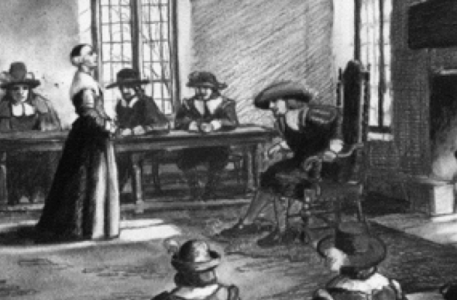Margaret Brent
Before joining her brother and his wife in Virginia, Margaret Brent made a name for herself in Maryland. She was arguably the most remarkable person in a remarkable clan. Born in 1601, she was the seventh child of Sir Richard Brent (1573-1652) and Lady Elizabeth Willoughby de Broke.
With her brother Giles Brent and other siblings, Margaret settled in Maryland in 1637. Margaret was no common immigrant, as she came with four maidservants, five male servants, and two letters from Cecil Calvert, Lord Baltimore, granting all the lands she could manage. The Brents, a Catholic family, were well educated and many of the men were trained in the law. Growing up in a household of lawyers, Margaret developed a working knowledge of this profession as well. By any measure, she could manage quite a bit: administering her own and sister Mary’s affairs; as executrix for deceased governor Leonard Calvert; and representing her brother Giles (I)’ legal interests. She appeared before Provincial Court at least 124 times between 1642-1650. Her own estate was “Sisters Freehold,” and she managed “Trinity,” “St. Gabriel,” and “Fort Kent.”
Margaret was the first woman in America to own vast tracts of land, have and manage her own business interests, govern a manorial estate, and ask for a vote in a colonial assembly. She appeared so frequently before Maryland officials that records from that colony list her as “Margaret Brent, Gentleman.” For a time her land holdings were second only to Lord Baltimore’s. In 1647 Governor Leonard Calvert appointed Margaret executrix of his estate.
The provincial court appointed her attorney for Lord Baltimore so she could handle both estates. The Governor even left her in charge of the colony during his absence. During this time, she assembled volunteers and put down Claiborne’s Rebellion of 1646. On Jan. 21, 1648 Margaret petitioned the Maryland Assembly for a voice in the proceedings and for two votes—one for herself and one as Lord Baltimore’s attorney. The Assembly denied her request.
Margaret’s brother, Giles Brent, developed political problems in Maryland and decided to move across the Potomac River to Westmoreland (now Widewater in Stafford County). Margaret and her sister Mary joined him in 1650 or 1651 and remained in Stafford until their deaths. Margaret retained her Maryland lands and acquired considerable property in Virginia.


